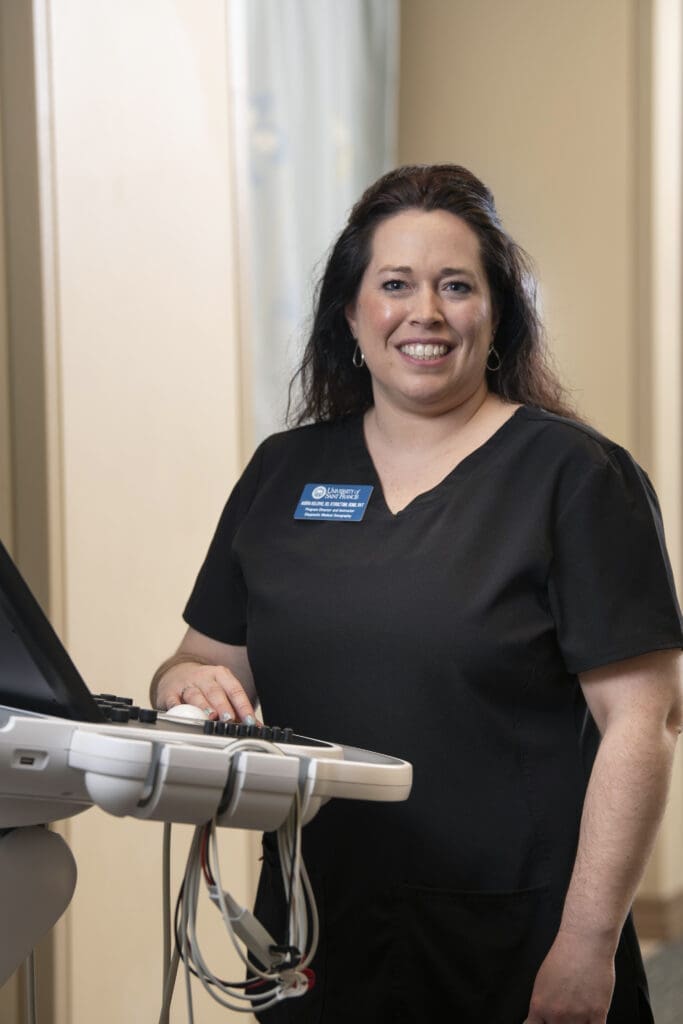Diagnostic Medical Sonography (AAS)
Earn a degree and launch your career as a medical sonographer in seven semesters (22 months) with our hybrid program. Choose from two tracks: Core Sonography and Cardiac Sonography. Five prerequisite courses are required.
- Degrees/Options
- Associate of Applied Science
- Length
- 22 months
- Locations
- Fort Wayne: Core and Cardiac Tracks
Crown Point: Core Track
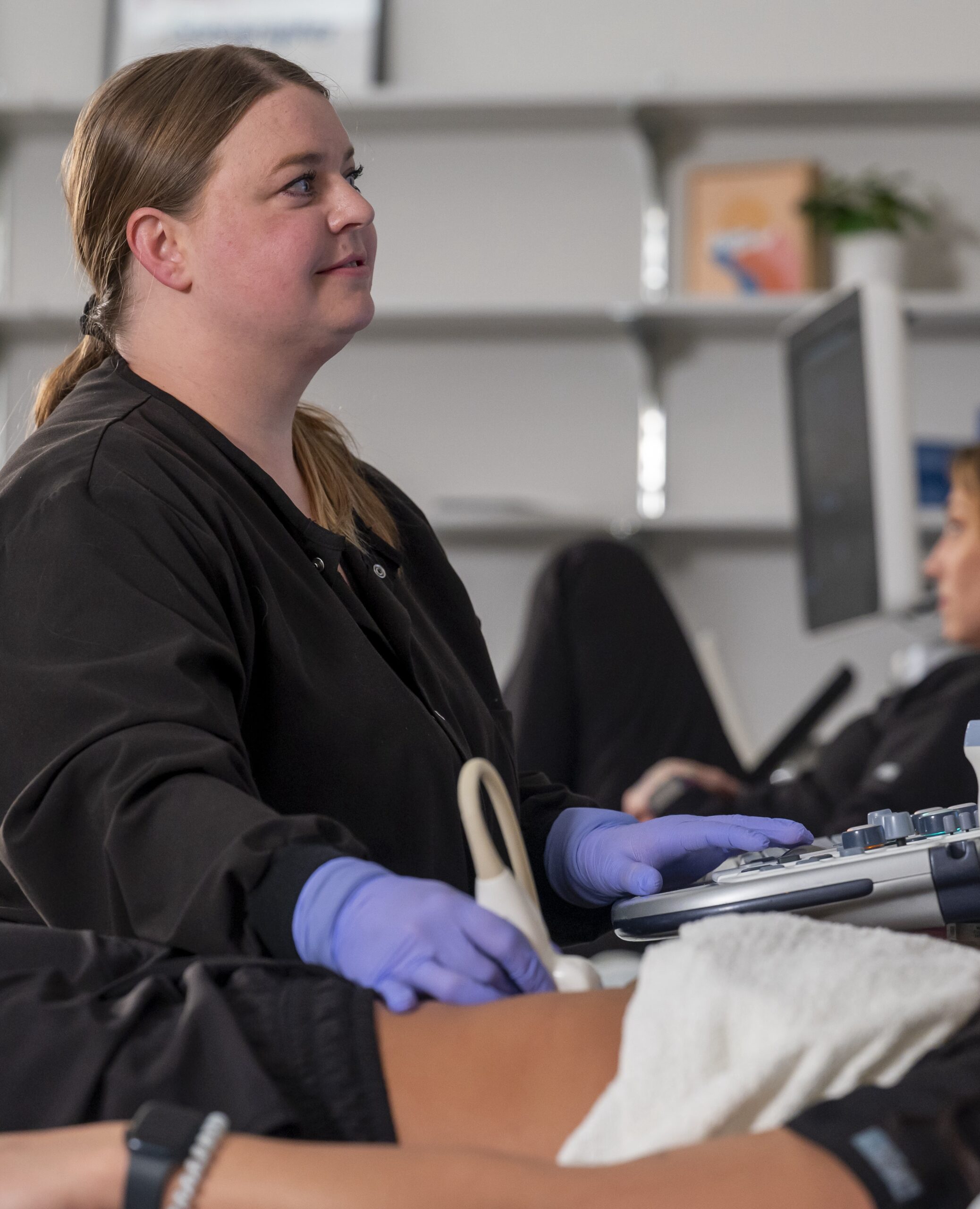
Why Study Sonography?
Medical sonographers play a key role in patient care by obtaining ultrasound images that help doctors diagnose and treat medical conditions. It’s an ideal position for anyone interested in being a critical member of a healthcare team and working in a capacity that combines technical skill with patient care.
Join a High-Need Field
The demand for diagnostic medical sonographers continues to grow throughout the U.S., including Indiana, Illinois and Ohio. Our AAS in Diagnostic Medical Sonography will give you the knowledge, skills and connections needed to step into an entry-level sonography position, as well as prepare you for certification.
9,600
Number of openings for diagnostic medical sonographers projected each year, on average, through 2032
BLS.gov
10%
Projected growth in employment opportunities for diagnostic medical sonographers through 2032 (much faster than average)
BLS.gov
$80,850
Median annual salary for diagnostic medical sonographers in 2023
BLS.gov
Why Saint Francis for Your Sonography Degree?
The University of Saint Francis is proud to be the region’s premier health science educator. Our sonography program builds on the strengths of our long-standing and highly respected nursing and allied health programs.
How It Works
The hybrid format blends asynchronous online courses with on-the-ground labs and clinical rotations. You’ll be taught by expert and supportive faculty throughout the program.
Our professional curriculum offers two specialty tracks, both of which will prepare you for the national certification exam via the American Registry of Diagnostic Medical Sonographers (ARDMS), Cardiovascular Credentialing International (CCI) or the American Registry of Radiologic Technologists (ARRT).
- Core sonography, where you’ll be prepared in abdominal extended, obstetrics/gynecology and vascular sonography
- Cardiac sonography, where you’ll be prepared in echocardiography
Applied Learning
As a diagnostic medical sonography student, you’ll start applying what you learn immediately—first in our state-of-the-art simulation labs and later in clinicals. Once in the field, you’ll further develop your technical and patient care skills by completing three rotations in different healthcare settings.
Clinical sites include:
- Parkview Health Network
- Lutheran Health Network
- Dupont Hospital
- Franciscan Health Network and Alliance Facilities
- Community Healthcare System
- Adams Memorial Hospital
- Cameron Memorial Community Hospital
Values Added
The Franciscan values, which are embedded in all courses, are key to the Saint Francis experience. These values teach us to be compassionate and ethical healthcare professionals, and are the hallmark of a University of Saint Francis education.
Bonus!
- Combine your medical sonography studies with our Health Services program and earn a bachelor’s degree. This will expand your career opportunities and can increase your earnings.
- If you’re already a credentialed sonographer, complete our Echocardiography certificate to expand your professional potential. This opportunity is also available to Diagnostic Medical Sonography AAS students who complete the Core track and want to expand their skills to include a certificate in cardiac sonography.

“The Diagnostic Medical Sonography program is excellent! We start off doing hands-on learning in the labs and then move into the field for clinicals. And the faculty care so much for the students here. They go above and beyond to help us.”
Annabelle Luttrell ’27 Diagnostic Medical Sonography major
“We are committed to bringing the Fort Wayne and Crown Point healthcare communities knowledgeable, competent and compassionate sonographers. Students will study in the 3-year program Abdomen Extended, Obstetrics/Gynecology, and Vascular curriculums to obtain a broad skillset that is desirable to area employers.”
Audra Koldyke Program Director
“My Diagnostic Medical Sonography professors have helped me reach my goals in so many ways. They are so caring, kind and passionate about our future careers and want nothing but the best for us. They strive to provide us with the best skills and I have never had better teachers. We are like a family and I will never forget how much they have been here for me through this entire process. I would recommend this program to anyone who has a caring heart for others and want to make a difference in healthcare.”
Ellie Tyler ’24 Diagnostic Medical Sonography major
“I like the learning environment a lot. The classes are small and there’s a lot of support from the faculty.”
Siham Rafiqui ’26 Diagnostic Medical Sonography major
Career Opportunities Abound
Medical sonography positions are in-demand at hospitals, physician offices, outpatient imaging centers, specialty hospitals and care centers.
As a core sonographer, you can work in the following specialties:
- Abdomen
- Breast
- Obstetrics and Gynecology
- Vascular
- Musculoskeletal
As a cardiac sonographer, you can specialize in adult echocardiography. With additional training, you can move into fetal echocardiography and pediatric echocardiography.
Sonographers with specialty training and experience often serve in team leadership and other supervisory roles.
Accreditation
The Saint Francis Diagnostic Medical Sonography program is proudly accredited by the Commission on Accreditation of Allied Health Education Programs (CAAHEP) upon the recommendation of the Joint Review Committee for Diagnostic Medical Sonography Programs (JRC-DMS).
The Saint Francis Diagnostic Medical Sonography program is currently accredited in these areas of sonography: Abdomen Extended, Obstetrics/Gynecology, and Vascular. Accreditation status ensures quality healthcare education is provided for students.
The Commission on Accreditation of Allied Health Education Programs (CAAHEP)
9355 113th St N, #7709
Seminole, Fl 33775
(727) 210-2350
www.caahelp.org
Joint Review Committee on Education in Diagnostic Medical Sonography (JRC-DMS)
6021 University Boulevard, Suite 500
Elliot City, MD 21043
(443) 973-3251
www.jrcdms.org
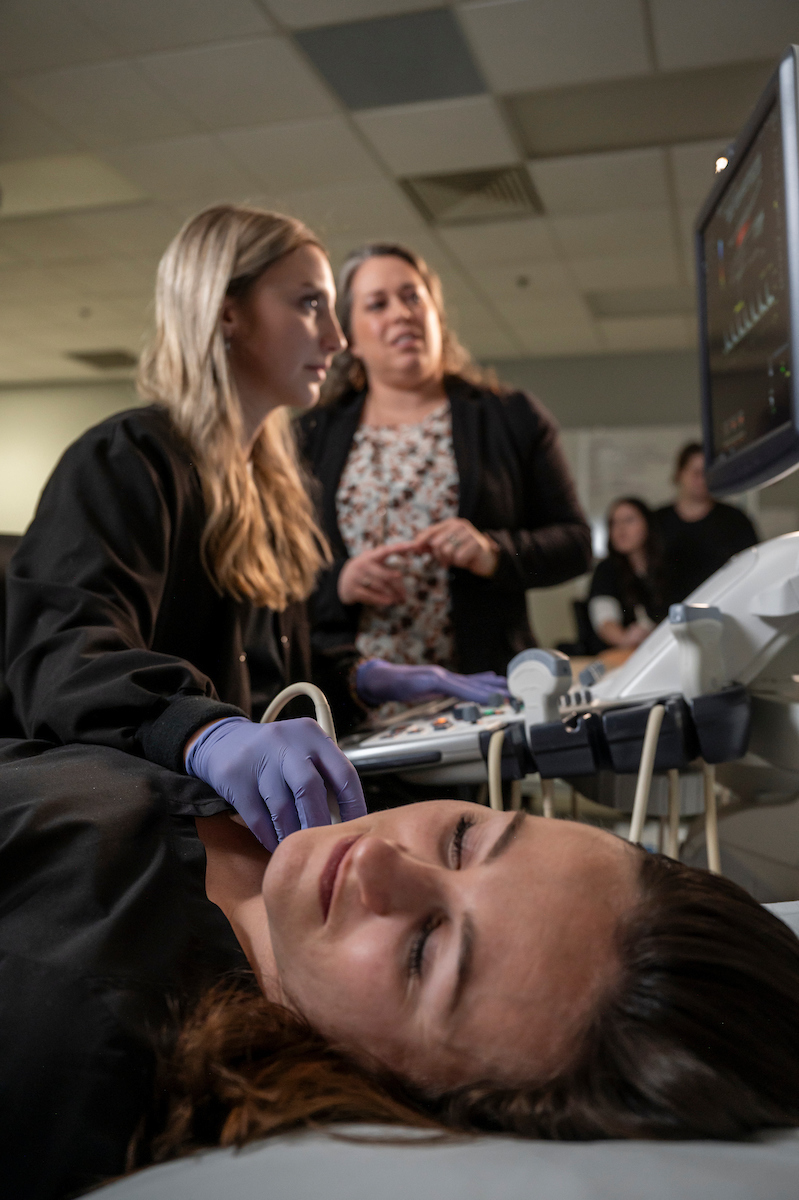
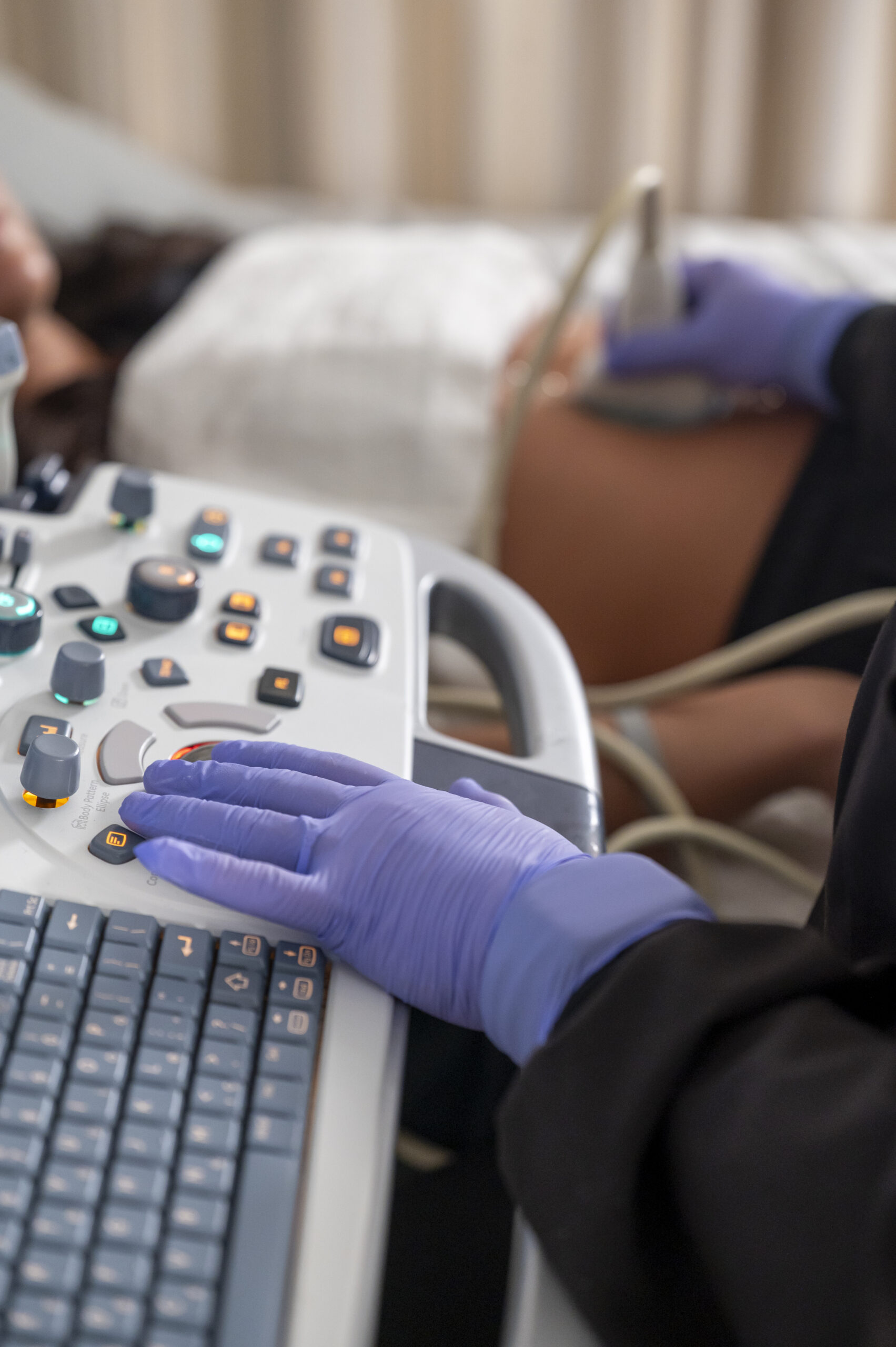
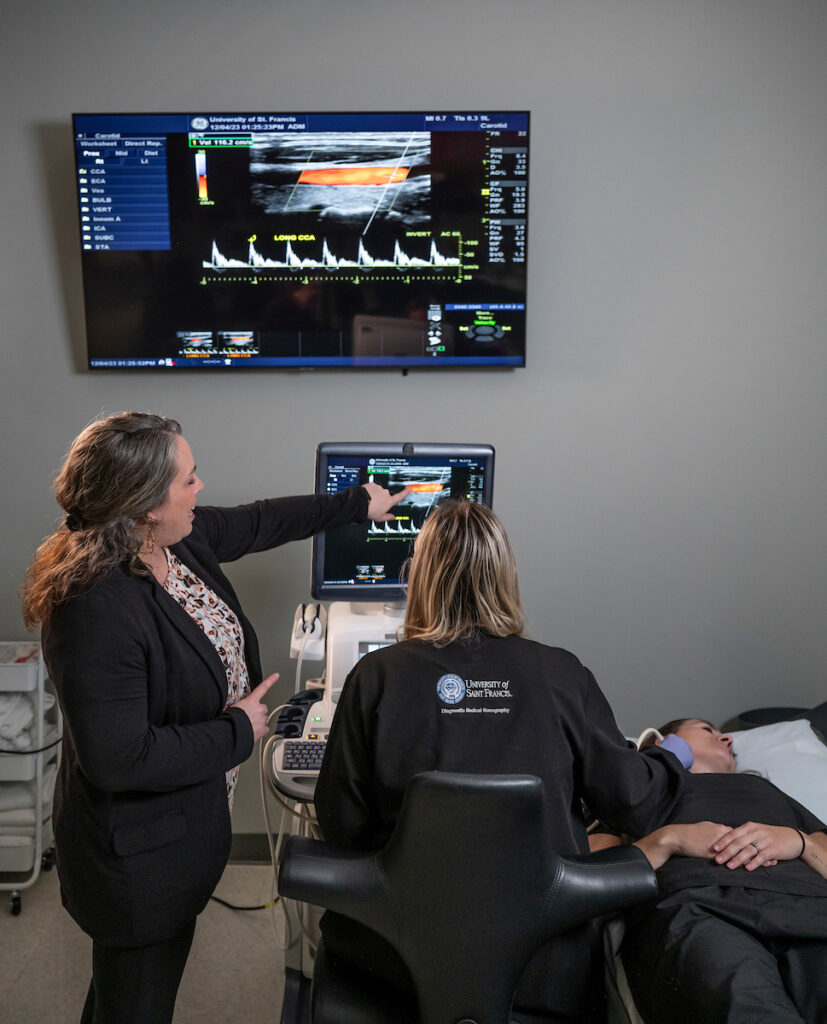
Learn more about what makes life at Saint Francis so special.
The credentialing organizations for sonographers are the American Registry of Diagnostic Medical Sonography (ARDMS), the American Registry of Radiologic Technologists (ARRT), and the Cardiovascular Credentialing International (CCI).
To prepare competent entry-level sonographers in the cognitive (knowledge), psychomotor (skills) and affective (behavior) learning domains for abdominal extended, obstetrics and gynecology, and vascular sonography concentrations. The program will provide high-quality didactic, lab and clinical atmospheres for transformative learning. Student sonographers will be able to think critically and compassionately. Understanding the complexities of healthcare will be a focus of the program, including areas of professionalism, ethical behaviors, and skilled and quality care. Through these goals, the Diagnostic Medical Sonography program complements the mission of the University of Saint Francis—cultivating individual personal growth through applied healthcare education that results in impactful professionals.
Program Goal Minimum Expectations:
- Provide high-quality education in didactic, lab and clinicals.
- Grow individuals to think critically, compassionately and ethically.
- Deliver professionals with entry level, but quality, skills who are impactful to healthcare and society.
- First Student Learning Outcome: Obtain, review and integrate pertinent patient history and supporting clinical data to facilitate optimum diagnostic results.
- Second Student Learning Outcome: Perform procedures in areas of abdominal, obstetrical, gynecological, small parts, superficial and vascular sonography; record anatomic, pathologic and/or physiologic data for interpretation by a physician.
- Third Student Learning Outcome: Exercise discretion and judgment in the performance of sonography diagnostic services.
- Fourth Student Learning Outcome: Demonstrate appropriate communication skills with patients and colleagues.
- Fifth Student Learning Outcome: Act in a professional and ethical manner.
- Sixth Student Learning Outcome: Provide patient education related to medical ultrasound and promote principles of good health.
Take a closer look at the Diagnostic Medical Sonography program handbook, your reference for program requirements, policies, student support, and the curriculum.
The University of Saint Francis has set policies and procedures regarding various student grievances that apply to all students.
All students are encouraged to resolve concerns or complaints directly with the appropriate faculty, staff, program directors, division directors or deans in an informal manner unless a formal university policy or procedure exists (such as formal policies for Financial Aid Appeal Procedure; Grade Appeal Policy and Procedure; Request for Review of Academic Policy; Appeal Review Procedures).
If the informal communication does not adequately address a student’s concerns, the student may contact the Vice President for Academic Affairs for academic concerns and the Vice President of Catholic Culture and Student Life for all other complaints or concerns. The Vice President will review the situation with the appropriate area and will either respond personally to the complaint or will direct the appropriate member of the institution to do so within 10 business days of receipt of the written complaint.
If a student feels that the USF grievance procedures have not adequately addressed their concerns and/or circumstances related to alleged violations of state consumer protection laws, they may wish to file complaints outside of USF.
Detailed complaint processes can be found here: University of Saint Francis Student Complaint Process
General Student Complaints
- The student discusses the concern with the faculty or staff member whom the student believes has taken improper action.
- If resolution is not achieved, the student discusses the problem with the appropriate director or dean in an informal manner unless a formal university policy or procedure exists.
- The student is to follow any process for which a formal policy exists.
- Financial Aid Appeal Procedure
- Grade Appeal, Request for Review
- If no formal policy exists, and the informal communication does not adequately address a student’s concern, the student may contact the following Vice Presidents:
- For any academic concerns, contact the Vice President for Academic Affairs.
- For all other complaints, contact the Vice President of Catholic Culture and Student Life.
- The Vice President will review the concern with the appropriate area and either respond personally to the student or will direct the appropriate personnel to do so within 10 days of receipt of the written complaint.
Discrimination, Harassment, Sexual Misconduct/Violence Complaints
- Complaints are filed with the USF Title IX Coordinator
Email: msalyer@sf.edu
Phone: 260-399-7700, ext. 6745
Office: FW Campus, Trinity Hall, room 105
- Cumulative minimum GPA of 2.7 on a 4.0 scale
- Completion of 74 credit hours, as set by the DMS Academic Plan
- Completion of all required DMS Clinical Competencies
- Meet all graduation requirements of the University of Saint Francis
Data Will Be Available in Spring 2025.
